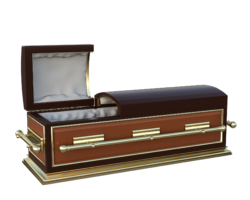
The casket was closed, the room empty except for a lone man sitting on a chair in the first row. He leaned forward, elbows on his knees, fingers in his thick black beard. He stared at the box that held his son, as motionless as the one within.
A tall, lanky man entered through the side entry, dressed in a black suit, his tie a deep red, like a wound. “Mr. Allison?” His voice disturbed the silence like a church bell in the night.
The bearded man blinked, stirred, and finally stood. He peered around hazily, returning again to the world. “Yes. You’re the one I talked to on the phone?”
“Yes.”
Mr. Allison motioned helplessly toward the casket. “Sudden heart failure. No previous condition. He’s seven. That doesn’t happen. It doesn’t make sense. It wasn’t supposed to happen.”
The man with the red tire laid his hand on the coffin. “Yet it did.”
“Yes,” Mr. Allison said fiercely. “And you’ll tell me why, right? Tell me who did it?”
The man with the red tie opened the coffin lid. “If I can, I will.” He retrieved a small device from his pocket, something about the size of a smartphone. From a compartment in the bottom of it he extracted two wires to place on–Mr. Allison kept his distance. He did not want to see.
“Why doesn’t someone stop it?” Mr. Allsion said. “It’s not right. It’s not just.”
“Money and power don’t always care about what’s right,” the man in the red tie said, tapping on the screen. “No one wants to die. That’s universal. If a little money, a bit of blackmail, finds its way to the right people….” He looked over his shoulder at Mr. Allison, who cowered near the first row of chairs. “There are things science cannot cure. Cancers it cannot kill, organs it cannot save, wounds it can’t staunch. But there are ways, dark, secret ways, the work of something that claims to be science and is not, to transfer the tragedy, to exchange the terminal illness, to pass off the death to another. Someone must die, of course, but why this person, who was rich and happy? If it just goes away, if someone somewhere you’ll never know or see dies, what of it? Tragedies happen all the time, especially to other people.”
He turned back to his work, shoulders bowed. Mr. Allison began to pace in short agitated lines. “You’ll tell me who did it, who cast this off to my son?”
“Yes.”
“How will you know?”
“There are traces, if you know what to look for.”
“Will you be certain? If I go to this person, if I find him in an alley or knock on his door and–it can’t be a mistake. It’s justice, not relief. He’s just gotta be–dead–like he should have been.”
The man in the red tie said nothing but studied the device, tapping on the screen with his thumbs. It emitted a soft buzzing. Mr. Allison sat suddenly, then stood again, then touched the gun concealed at his waist, just to be sure.
“It should be outlawed,” Mr. Allison said. “”We’re playing god, deciding who lives and dies.”
“It is outlawed. Everywhere.”
“Who would do it, anyway? Who’d be so callous to sacrifice another just so you could live?”
“It’s no one,” the man said, disconnecting the wires. “Just a payment and a miraculous cure, a healing, a resurrection. You don’t see it. Maybe it was some abusive husband or drug lord. You don’t know. It could be some starving person across the world you just put out of their misery. You say all sorts of things.”
He put the device back in his inner jacket pocket, looked long at the boy, and closed the lid. “It’s a good business,” he said softly. “As long as you don’t put a face to it.”
Mr. Allison grabbed his shoulder and forced him around. The man in the red tie did not resist. “Who is it?” Mr. Allison demanded. “What’s his name? What’s his address?”
The man’s face held no emotion, his eyes no life. “There is no one.”
“What–what do you mean. Didn’t it work? Do you want more money? I’ll pay you anything, I’ll–”
“No one transferred this to your son, Mr. Allison. The readings were clear.”
“It doesn’t happen to little boys, it doesn’t make sense. It doesn’t–”
“Sometimes it does. One in a million, but it does. If you had called me earlier, maybe I could have–but that’s how it starts.” The man gently removed Mr. Allison’s hand from his arm. “I’m sorry I couldn’t help, Mr. Allison. Roger. I am truly sorry.”
He walked slowly out of the room. Roger Allison clung to the coffin, unable to weep.